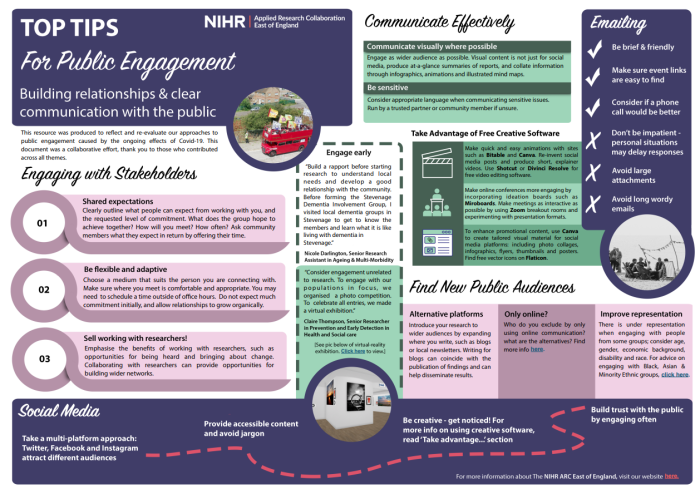This blog introduces our Public and Community Involvement, Engagement and Participation (PCIEP) Lead Dr Bryony Porter, who shares why community engagement is so important and how ARC EoE is embedding these approaches in our projects.

In June 2022, I started working with the ARC EoE core team as the Public, Community, Involvement, Engagement and Participation (PCIEP) Lead. In this role, I co-chair the PCIEP Coordinating Group with a public contributor and oversee the implementation of the ARC PCIEP Strategy. I previously attended this group to represent the Mental Health Over the Life Course theme and learned a lot from colleagues across all ARC EoE research themes about approaches to community engagement.
"Community engagement is important to ensure that research is relevant, useful and impactful to the groups that researchers are working with. It helps to prioritise what is needed, and important to people in those communities, to address their health needs and inequalities."
Dr Bryony Porter, Public and Community Involvement, Engagement and Participation Lead
Community engagement can also help to improve understanding of research and develop better relationships between researchers and the people our research projects serve.
My path in research and community engagement
My journey into research began when I moved to Norwich for my PhD at the University of East Anglia, investigating the use of multiple medications in people with dementia. My research interests have since expanded to focus on mental health for students, health and social care staff – working on projects during the Covid-19 pandemic, and community mental health, working with Men’s Sheds, Norwich Foodbank and local authorities to understand hoarding behaviours in Council owned properties.
I received ARC funding as a Senior Research Associate at the University of East Anglia, as a postdoctoral researcher with the Mental Health Over the Life Course theme. This role began in early 2020 to develop and support projects on mental health and wellbeing of health and social care staff and developed into projects during the pandemic to understand the impact of providing end of life care during a pandemic on staff, in collaboration with colleagues in the Palliative and End of Life Care theme, developing an implementation tool to prevent suicide in the ambulance sector and evaluating system-wide occupational health and HR provision for primary care staff. I also led a project with UK Men’s Sheds to understand the impact Sheds have on members’ wellbeing, and the role of social prescribing and referrals into Sheds.
Working with UK Men’s Sheds, I saw the benefit of developing a project with the community to enhance the planning, delivery and dissemination of findings. Men’s Sheds are community spaces where men come together to connect, converse and create, through workshop activities like woodwork or metal work. The Men’s Sheds community are very proud of the spaces they have created, which are usually led by volunteers who come to their local Shed for their own personal reasons.
Before we applied for funding to support this project, we talked to Shed members about what they would find useful to help them take part in research, how they would like to be involved and how the findings could be shared in ways that would help them. These discussions shaped the research questions we asked and led to a whole range of feedback and dissemination approaches, including an online conference with UK and Ireland Men’s Sheds to demystify social prescribing, and a report on current views and experiences.
Public and Community Involvement, Engagement and Participation (PCIEP) at ARC EoE
The PCIEP Coordinating Group meets four times a year and brings together public contributors and representatives from every ARC EoE research theme to share experiences of public and community involvement in research. We invite researchers to join these meetings to share their insights, reflect on any challenges and learning from projects they have worked on.
The ARC EoE PCIEP Strategy has three key aims to extend research into this area, increase participation, engagement and involvement of diverse groups and under-represented communities. We strive to meet the INVOLVE standards for public involvement as a whole programme and use them to reflect on and improve our practices to ensure we offer inclusive opportunities, work together, support and learn from each other, communicate well, with good governance for projects, and make an impact!
The Inclusive Involvement in Research for Practice Led Health and Social Care theme continues to develop methods for best practice in PCIEP, including developing resources for inclusive involvement online, in response to the rapid increase in - and reliance on - virtual methods during the Covid-19 pandemic.
We continue to reach out to underrepresented communities in our four populations in focus, which were selected as areas in the East of England that could benefit from research to address socioeconomic and health inequalities. We involve members of the public, community workers, patients, service users and carers from each area in shaping our work through a variety of regular engagement activities. This included walks in Essex (Grays), Peterborough, Stevenage and Waveney over 2022 to find out more about local experiences and healthcare needs.
My tips for successful community engagement
"Through my experiences I’ve learned that building relationships for community engagement takes time and commitment, and a friendly, approachable way of working with clear communication can make a huge difference."
Dr Bryony Porter
Create a clear understanding and manage expectations from working with you. Consider and clarify what this will involve for the community, how you will meet and how often, and what you hope to achieve together.
Share with the community how their feedback or involvement had an impact on the project. This Researcher Feedback Form can be helpful in reflecting and evaluating the contribution of public groups to research.
Different approaches will suit different communities and it is important to be open-minded, flexible and adapt to the needs of the community you are working with.
ARC EoE has a huge wealth of expertise in community engagement and I would encourage anyone who would like to find out more or discuss ideas to contact me for help or resources.
- Download the NIHR’s top tips for public engagement below:
